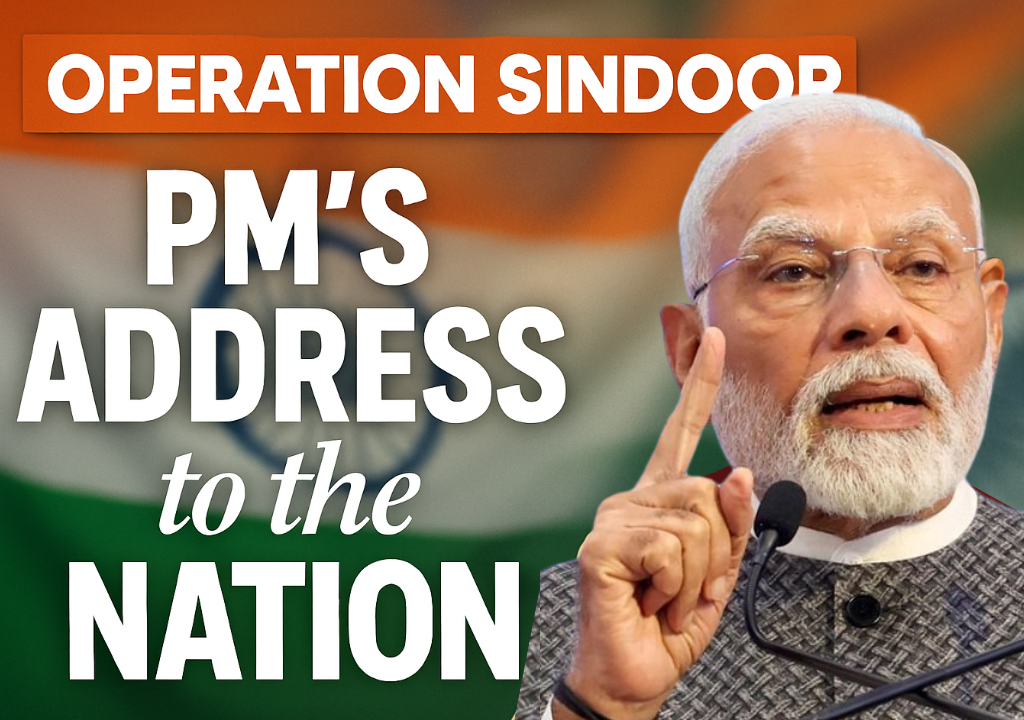Prime Minister Narendra Modi today addressed the nation on the significant developments following Operation Sindoor, outlining India’s security doctrine in response to terrorism and Pakistan’s nuclear threats. In his 22-minute speech, PM Modi firmly declared that India will not be intimidated by nuclear blackmail and will retaliate against any terrorist attacks with strong and decisive action.
The speech emphasized India’s unwavering stance on counterterrorism operations and addressed the reality of Pakistan’s support for terrorism. PM Modi highlighted Bahawalpur and Muridke, two sites struck during Operation Sindoor, as “global universities of terror.”
India’s 3 Principles of Security Doctrine
PM Modi outlined three key principles that have shaped India’s evolving security approach:
1. Strong and Resolved Response to Terrorism
“Any terrorist attack on India will be met with a strong and resolute response. India will retaliate on its own terms, targeting terror hubs at their roots,” PM Modi said.
This principle is a direct reflection of the outcomes of Operation Sindoor, where India targeted nine terror sites across Pakistan and Pakistan-Occupied Kashmir (PoK), successfully neutralizing over 100 terrorists linked to Lashkar-e-Taiba and Jaish-e-Mohammed.
2. No Intimidation by Nuclear Blackmail
India will not be intimidated by nuclear threats from Pakistan. PM Modi emphasized that any terrorist safe haven operating under this pretext would face precise and decisive strikes.
This message underscores India’s commitment to defending its sovereignty and sending a clear message to Pakistan that nuclear threats will not deter India’s determination to counter terrorism.
3. No Separation Between Terrorists and Governments
PM Modi highlighted that India will no longer treat terrorist leaders and the governments sheltering them as separate entities. He referred to the disturbing evidence of Pakistani military officials attending the funerals of terrorists, which exposed Pakistan’s deep involvement in state-sponsored terrorism.
During Operation Sindoor, India struck key terrorist infrastructure and took out Pakistan’s military installations, including airbases and air defense systems in Lahore.
🔗 Also Read: Indian Fighter Jets Bomb Pakistan Air Bases »
Terrorism and Talks Can’t Happen Together
PM Modi continued by addressing Pakistan’s role as a terrorist state, with Bahawalpur and Muridke becoming “global universities of terror”. He pointed out that these sites had been linked to major global terror attacks, including the 9/11 attacks and the London Tube bombings. Furthermore, these sites were linked to every major attack on Indian soil in the past decade.
PM Modi firmly stated that terror and talks cannot coexist, and that terrorism and trade cannot run parallel. He also reaffirmed that blood and water cannot flow together, a direct message to Pakistan, emphasizing that any future talks between India and Pakistan would only occur on terrorism and Pakistan-Occupied Jammu and Kashmir — nothing else.
Precision Strikes: India’s Military Success
The precision strikes carried out by India during Operation Sindoor successfully targeted Pakistan’s terror infrastructure. Indian forces destroyed terrorist training camps, weapons depots, and military airbases in Pakistan and PoK. The operation also neutralized aerial threats by targeting Pakistan’s air defense system in Lahore.
PM Modi pointed to a video showing Pakistani military officials attending the funerals of terrorists, whose coffins were wrapped in the Pakistani national flag, illustrating Pakistan’s direct involvement in supporting terrorism.
📌 Related Reading: UNSC Grills Pakistan Over Pahalgam Attack, Demands Accountability
Pakistan Seeks De-escalation
Following significant losses, Pakistan sought ways to de-escalate tensions and appealed to the global community for relief. PM Modi revealed that Pakistan’s military reached out to India’s DGMO on the afternoon of May 10, confirming the ceasefire agreement. Despite this, India made it clear that future acts of terrorism by Pakistan will be considered as an act of war and will be met with a decisive response.
Conclusion
India’s security doctrine, as outlined by PM Modi, marks a significant shift in the country’s approach to counterterrorism and national defense. The Prime Minister’s speech made it clear that India will not bow down to nuclear threats or tolerate Pakistan’s support for terrorism.
PM Modi’s statement reaffirms India’s commitment to maintaining a strong defense against terrorism and to taking decisive action against any state or entity that supports or harbors terrorists.

